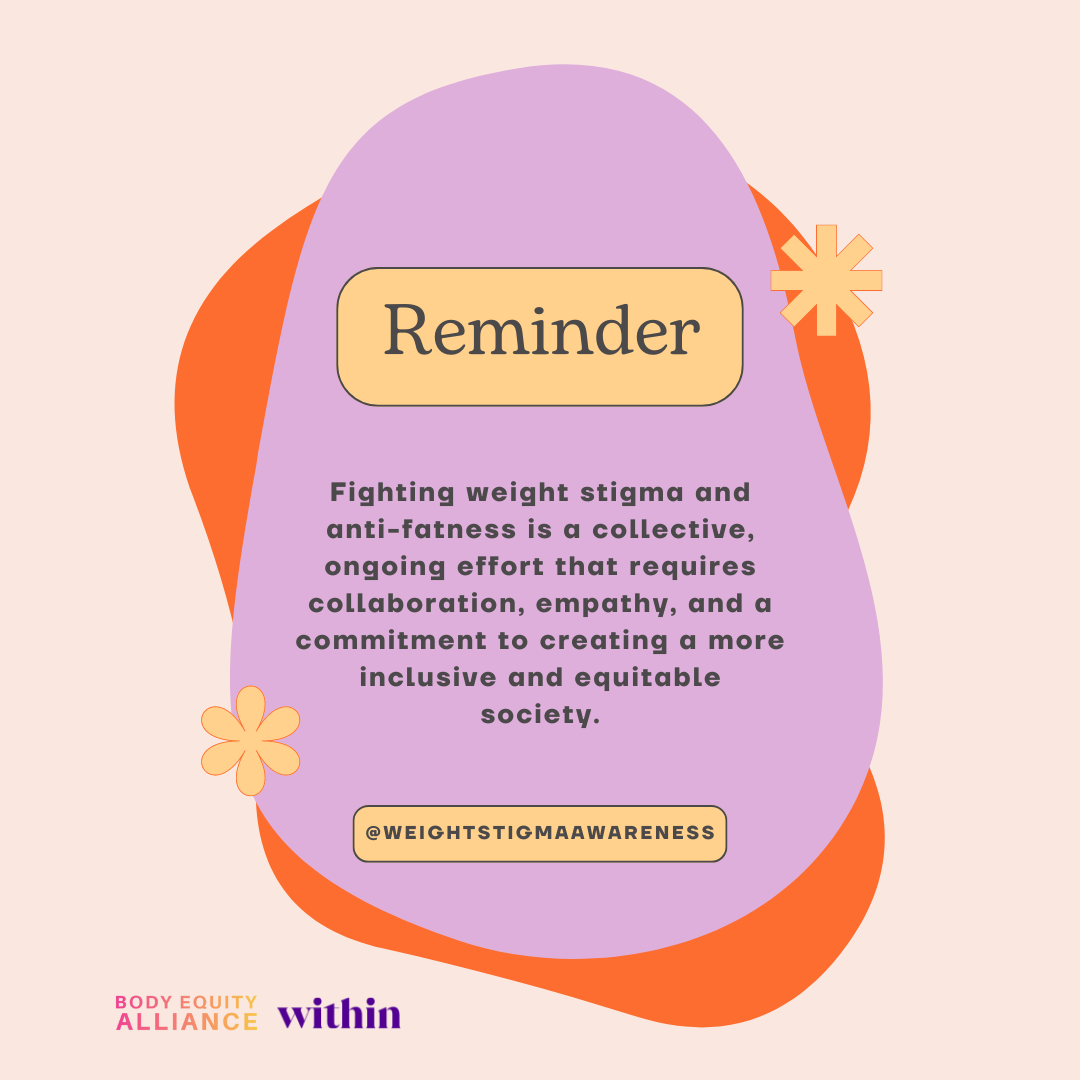Weight Stigma Awareness Week is an annual campaign aiming to eliminate weight bias and ‘end the resulting stigma, shame, trauma, and discrimination around body shape and size’. This post explores the impacts of weight stigma and what we can do to change it.
What is Weight Stigma?
Stigma occurs when an individual or group is viewed in a negative way or treated differently because of a particular characteristic they possess. Weight stigma refers to discrimination against people based on body weight and size. This stigma is a result of weight bias, which involves prejudicial attitudes and beliefs about people based on their their weight. Weight stigma and bias can show up in a multitude of ways, including:
Stereotypical beliefs - e.g. making assumptions about a person based on body size and attributing certain personality traits / characteristics to people based solely on their weight
Negative attitudes - e.g. a dislike of people because of their weight
Discriminatory behaviours - e.g. social exclusion, bullying
Internalised weight stigma occurs when people hold negative and critical beliefs about their own body weight, which can happen regardless of actual body size. This is however more often experienced by people who have bodies larger than the cultural ‘ideal’.
Note – we’re using the word ‘fat’ throughout this post as a descriptor of a bodily characteristic. This neutral use of the term represents an acceptance of all body sizes, and is free from judgement.
Where does weight stigma come from and what does it look / sound like?
Like other biases that result in stigma (e.g. racism, homophobia, ableism etc), weight stigma is the result of conditioning from exposure to common negative messaging about weight and fatness which leads us to think about weight and larger bodies in unhelpful ways. People aren’t born with inherent weight bias; it’s learned, usually in families and communities from a young age. Weight stigma can be perpetuated in many areas, including:
Healthcare settings
‘Diagnosis fat’, where a health practitioner attributes symptoms purely to a persons weight, often causing them to not investigate further, potentially missing underlying / other causes
The ‘War on Obesity’, with a the push to categorise certain body weights / shapes as a disease, using BMI as a marker of individual health
Health concern about behaviours exhibited by fat people, while thin people are given a pass for engaging in similar behaviours
Under-recognition of the impact of genetics and broader environmental factors influencing weight and body size, and overemphasis of the role of individual behaviours and a perception of the ability to control body weight and size
In the media
Fat bodies are often dehumanised in news stories, shown as ‘headless torsos’, or exhibiting stereotypical behaviours, e.g. eating certain foods
In movies and books fat characters are rarely portrayed positively, often relegated to being the villain, the comedic relief, or with a storyline of their weight as a struggle to be overcome
Social media algorithms promoting content of people with thinner bodies, and limiting the reach of fat content creators
In public spaces
Shops only stocking larger clothing sizes online rather than in store (or not supplying larger sizes at all)
Seating which limits who can comfortably use it, e.g. airplanes, lecture theatres, cinemas, booths / tables with unmovable chairs
In workplaces & social settings
Weight has been shown to influence hiring decisions and affect career progression / promotions
Diet talk which often shows up in lunchrooms or at social events involving food, e.g. good / bad food talk, complimenting weight loss and talking negatively about weight gain
Colleagues encouraging others to diet and offering unsolicited weight loss advice
In eating disorder treatment settings
Outdated weight criteria built into diagnostic labels, e.g. continuing to differentiate between anorexia nervosa and ‘atypical’ anorexia nervosa, despite a growing body of evidence which shows there are few if any differences between these presentations (beyond body size)
Perpetuating the fear of fatness by setting weight restoration targets too low, encouraging weight loss in higher weight people with eating disorders, or promising people that they wont gain weight in recovery
What’s the impact of weight stigma on individuals and communities?
While weight stigma can negatively impact the health and wellbeing of a range of individuals and communities, the impact is disproportionately felt by people in larger bodies. As with other forms of stigma, these negative impacts are typically the results of the accumulation of repeated common experiences of discrimination (micro-aggressions) rather than a single event.
The negative impacts of weight stigma can include:
Poorer mental health, e.g. changes to mood, development of mental illness, use of coping strategies which further impact mental health
Impacts of prolonged exposure to stress and stress hormones on physical health
Isolation, both from social exclusion by others and fear / anticipation of rejection based on previous experiences impacting behaviour
Delaying medical care due to concern about weight based discrimination experiences from healthcare providers, or having illness missed due to ‘diagnosis fat’
Perpetuating dieting and disordered eating behaviours in an attempt to try and control weight which often leads to weight cycling and poorer physical health
With all this in mind it’s important to remember that we shouldn’t only care about weight stigma because it’s bad for people’s health – but because everyone, in all bodies - deserves to be treated with respect.
What can be done about Weight Stigma?
Like other forms of stigma a multifaceted approach is needed which includes advocating for structural change, e.g. legislating to protect people from weight-based discrimination, education campaigns to help challenge weight bias, identifying and eliminating weight bias in healthcare education settings etc.
Individuals can also act to address weight stigma by:
Interrogating your own beliefs about weight, and understanding where these beliefs come from. This blog is just a starting point, we recommend taking a ‘deep dive’ into some of the resources listed below
Pushing back against weight-based discrimination whenever you see or hear it (and not only when you’re around fat people)
Ditching food and body talk and weight / appearance based compliments - there are many more interesting things to talk about than commenting on a persons appearance
Requesting that public spaces are accessible for all bodies, and not leaving this up to fat people alone to advocate for this, e.g. cinema / airplane seating, chairs in waiting rooms, clothing accessibility
Supporting and consuming media content produced by fat people, and content which includes positive representations of fatness
Being an ally to people who experience weight based discrimination




